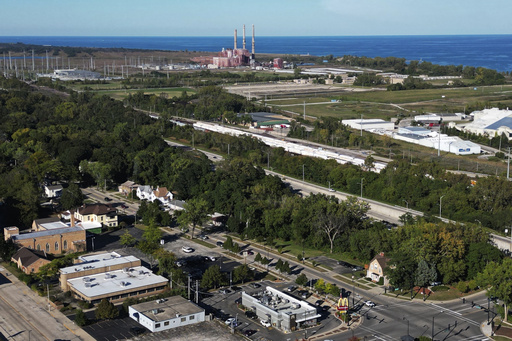This scarcity of signs reflects a broader issue: Waukegan is located in Illinois, a state that does not serve as a key battleground in presidential elections. Muchowski pointed out that the current political structure in the U.S., specifically the Electoral College, results in disproportionate attention and funding focused on states that are politically competitive, sidelining many voters and their concerns across the country. This lack of focus is instigating feelings of neglect among residents, particularly in Waukegan, which is a suburb of Chicago with a predominantly Latino populace.
Former President Donald Trump last visited the city in 2020 when he briefly appeared at the local airport before quickly heading to Kenosha, Wisconsin. In contrast, his rally in Racine, Wisconsin—a city similar in size—saw Trump celebrate local development, drawing a stark comparison in how candidates engage with varying communities.
Waukegan remains largely overlooked in the national dialogue during election cycles, a sentiment echoed by Muchowski, who has spent his life in the area. He emphasized the frustration felt by residents who see their votes given less weight compared to those in battleground states, leading to a perception of disenfranchisement particularly among urban and racially diverse voters.
This year’s presidential campaigns have predominantly bypassed Illinois due to its predictable Democratic leanings. Both major parties’ candidates have only made limited appearances in the state, while they have visited Wisconsin 27 times recently. The ongoing emphasis on battleground states, which make up only a fraction of the population, has further fueled this feeling of neglect, as evidenced by data showing the majority of campaign stops concentrated in just a few states, with Pennsylvania receiving the most visits.
Tim Walz, vice presidential nominee, recently spoke about support for a national popular vote, indicating a recognition of the distortions created by the Electoral College. However, he acknowledged the challenges in overhauling the system, as it requires a constitutional amendment. This informs the campaign’s current strategy, which aims to concentrate resources in pivotal battlegrounds.
Waukegan residents express a deep desire for acknowledgment from candidates, with many noting the city’s rich multicultural heritage. Yet, the community continues to suffer from above-average poverty and unemployment rates, alongside a struggling school district and substantial environmental issues stemming from historical industrial activities.
The contrast between Waukegan and cities like Racine underscores the neglect felt by residents. Local leaders have voiced concerns about systemic issues such as gun violence, housing shortages, and healthcare access within their community, attributing much of this neglect to the priorities dictated by the Electoral College system.
Sam Cunningham, a former mayor, articulated the sentiment of being overlooked, understanding that political strategies favor battleground states over cities like Waukegan. He expressed the pain felt in the community, emphasizing that the lack of attention has lasting consequences on voter sentiment.
Margaret Padilla Carrasco, a lifelong Waukegan resident, attended a campaign rally in nearby Milwaukee, expressing what she would show to visiting candidates—deteriorating neighborhoods and struggles faced by constituents. She stressed the importance of engagement from candidates, noting that the community deserves to be heard and acknowledged for its needs, or else it risks alienating a base that traditionally supports Democrats.
Others, like James Richard Wynn, feel especially neglected as conservatives in a heavily Democratic area. His perspective highlights how certain viewpoints may be sidelined entirely in larger election narratives, contributing to a disillusionment with the political process.
Nevertheless, Waukegan’s resilience shines through grassroots efforts as residents mobilize for various local issues like housing and environmental justice. Community leaders, including Pastor Julie Contreras, underscore the city’s vibrant dealings that go unseen by the broader political spectrum. Residents are invested in their community’s future and want candidates to recognize the potential and strength that lies within.
Despite the obscurity imposed by the political landscape, Muchowski champions Waukegan as a “city of grit and imagination.” He believes that if political candidates would shift their focus to recognize this potential, the city could gain the recognition it deserves.
